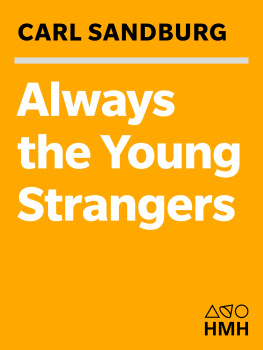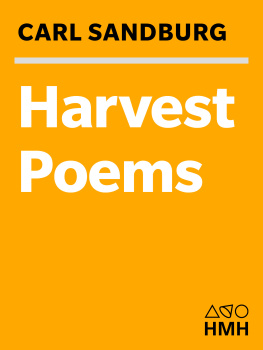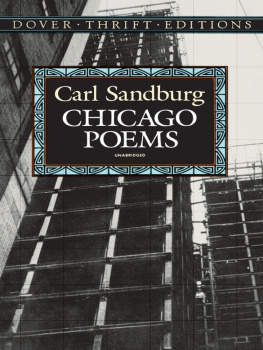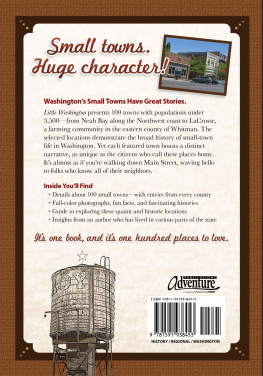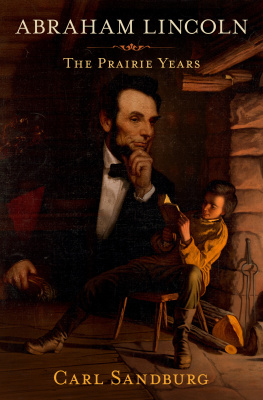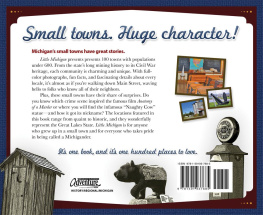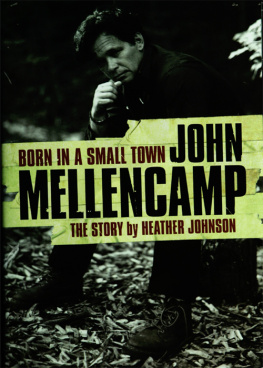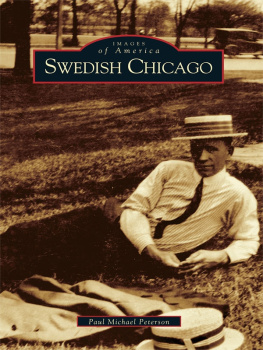Sandburg - Always the Young Strangers
Here you can read online Sandburg - Always the Young Strangers full text of the book (entire story) in english for free. Download pdf and epub, get meaning, cover and reviews about this ebook. City: San Diego, year: 1991, publisher: Houghton Mifflin Harcourt;Harcourt Brace Jovanovich, genre: Non-fiction. Description of the work, (preface) as well as reviews are available. Best literature library LitArk.com created for fans of good reading and offers a wide selection of genres:
Romance novel
Science fiction
Adventure
Detective
Science
History
Home and family
Prose
Art
Politics
Computer
Non-fiction
Religion
Business
Children
Humor
Choose a favorite category and find really read worthwhile books. Enjoy immersion in the world of imagination, feel the emotions of the characters or learn something new for yourself, make an fascinating discovery.
- Book:Always the Young Strangers
- Author:
- Publisher:Houghton Mifflin Harcourt;Harcourt Brace Jovanovich
- Genre:
- Year:1991
- City:San Diego
- Rating:5 / 5
- Favourites:Add to favourites
- Your mark:
- 100
- 1
- 2
- 3
- 4
- 5
Always the Young Strangers: summary, description and annotation
We offer to read an annotation, description, summary or preface (depends on what the author of the book "Always the Young Strangers" wrote himself). If you haven't found the necessary information about the book — write in the comments, we will try to find it.
Always the Young Strangers — read online for free the complete book (whole text) full work
Below is the text of the book, divided by pages. System saving the place of the last page read, allows you to conveniently read the book "Always the Young Strangers" online for free, without having to search again every time where you left off. Put a bookmark, and you can go to the page where you finished reading at any time.
Font size:
Interval:
Bookmark:
Copyright 1953, 1952 by Carl Sandburg
Copyright renewed 1981, 1980 by Margaret Sandburg, Helga Sandburg Crile, and Janet Sandburg
All rights reserved. No part of this publication may be reproduced or transmitted in any form or by any means, electronic or mechanical, including photocopy, recording, or any information storage and retrieval system, without permission in writing from the publisher.
For information about permission to reproduce selections from this book, write to or to Permissions, Houghton Mifflin Harcourt Publishing Company, 3 Park Avenue, 19th Floor, New York, New York 10016.
www.hmhco.com
Scroll and Broken-Face Gargoyles from The Complete Poems of Carl Sandburg, copyright 1950 by Carl Sandburg and renewed 1978 by Margaret Sandburg, Helga Sandburg Crile, and Janet Sandburg, reprinted by permission of Harcourt Brace Jovanovich, Inc.
The Library of Congress has cataloged the print edition as follows:
Always the young strangers/Carl Sandburg,
p. cm.
Includes index.
ISBN 0-15-604765-9
1. Sandburg, Carl, 18781967BiographyYouth. 2. Poets, American20th centuryBiography. I. Title
PS3537.A618Z464 1991
811'.52dc20 91-28099
e ISBN 978-0-544-78401-7
v1.1015
TO MARY, MART, AND ESTHER
SCROLL
Memory is when you look back
and the answers float in
to who? what? when? where?
The members who were there then
are repeated on a screen
are recalled on a scroll
are moved in a miniature drama,
are collected and recollected
for actions, speeches, silences,
set forth by images of the mind
and made in a mingling mist
to do again and to do over
precisely what they did do once
this is memory
sometimes slurred and blurred
this is remembering
sometimes wrecking the images
and proceeding again to reconstruct
what happened and how,
the many little involved answers
to who? what? when? where?
and more involved than any
how? how?
From Carl Sandburg, COMPLETE POEMS
ALWAYS THE YOUNG STRANGERS
All I can give you now is broken-face gargoyles.
All I can give you now is a double gorilla head with two fish mouths and four eagle eyes hooked on a street wall, spouting water and looking two ways to the ends of the street for the new people, the young strangers, coming, coming, always coming
It is early.
I shall yet be footloose.
BROKEN-FACE GARGOYLES
ONE
A big unseen bell goes Bong! Knots come loose, long-woven bonds break from their folds and clutches. It is my time now, says the mother while tugs and struggles in her womb say, My time too has come. There is a tearing asunder of every last hold and bond, the violence of leaving the nine-month home to enter a second and vastly larger home. In the mother and the child the crashes and explosions go on, a series leading to the final expulsion. Not till then can there be a birth certificate, a name and a christening, a savage small mouth tugging at pink nipples.
Many have written and spoken it, I was bornwhy? Seeking the answer in brief, some have summarized it, I was born because my father and mother met and exercised between them an ancient act of passion, love, and generation.
In my case the announcement came, Det r en pojke, the Swedish for It is a boy, and so definitely not, Det r en flicka. The first baby, some three years earlier, was my sister Mary. They wanted a boy. I was a welcome man-child.
I was born on a cornhusks mattress. Until I was past ten or more years, when we became a family of nine persons, I remember the mattresses were bedticking filled with cornhusks. And as we all slept well on cornhusks and never knew the feel of feather beds till far later years, we were in favor of what we had. Of the slats on which the mattress rested, we sometimes murmured. One would break, then another, till finally the mattress crashed to the floorand we were suspicious of the new slats.
I was born a little after midnight, my mother told me. A Swedish midwife had been at hand early in the evening. She cut the umbilical cord, tended to the afterbirth, did her responsible duties, and was praised for her skill. This was in a three-room frame house on Third Street, the second house east of the Chicago, Burlington & Quincy Railroad tracks, in Galesburg, Illinois. The date was January 6, 1878. Exactly one year later on January 6 Joseph Medill Patterson was born. Exactly one hundred years earlier on January 6 Thomas Lincoln, the father of Abraham Lincoln, was born. And the coincidences of these births dont mean a thing except that the odd facts stick in the mind even though they prove nothing.
The midwife stayed two days, doing the needful, cooking and cleaning, seeing to my fathers breakfast before he left to start swinging hammer and sledge at the C.B.&Q. blacksmith shop at seven in the morning. After those two days my mother was up and around, doing a washing, cutting and sewing diapers. Some of my diapers she made from Pillsbury Best Flour sacks. When the later babies came I saw her cut and hem the Pillsbury sacks in which came a white flour. Often we children heard from the father and mother, In the old country we had white bread only at Easter and Christmas. Here in America we have white bread every day in the year!
Of the house where I was born I remember nothing. I sucked at my mothers breasts there, had hundreds of changes of diapers and took healthy spankings there yet memory is a blank on those routine affairs. My sister Mary once pointed at the cradle in later years and said, When they took me out they put him in. And a year and a half later they took me out to put Mart in. The cradle stood on three legs at each end, and mother told Mary that father made the cradle with his own hands. Mary said too that before I was three I ran away from home one afternoon and mother sent her to the C.B.&Q. shops and she brought father home from the shop and he found me a few blocks away going nowhere in particular.
We moved to another three-room one-story house, this on the north side of South Street, three doors west of Pearl Street. Here I wore dresses and watched my father spade a garden and plant and dig potatoes and carrots. I can never forget the feel of potatoes and carrots as my fingers brushed the black loam off them and I threw them into the baskets. Here we had the mare Dollya small bay, old, fat and slowkept in a shed at the end of the lot. It was ten or fifteen dollars my father paid for Dolly, selling her after a year or twofor ten or fifteen dollars.
Dolly pulled us in a four-wheeled, two-seater wagon out from the town streets and houses to where we saw for the first time the open country, rolling prairie and timber, miles of zigzag rail fences, fields of corn and oats, cows, sheep, and horses feeding in pastures. Grazing animals in the open had wonder for me then and will always have.
We were fairly regular at Swedish Lutheran Church services, though about once a month of a Sunday morning father would throw the harness on old Dolly and the word was, We are going to the Kranses. Out seven miles near a small coal-mine crossroads with a post office named Soperville, on a thirty-acre farm, lived John and his wife Lena Krans, Lena a cousin of my mother. Those four Swedish-born Americans had warm kinship. Their faces lighted on seeing each other. The Swedish language was hurled back and forth, too swift for us children to be sure what they were saying. When they talked of the steerage trip from Sweden, six to ten weeks on a sailing ship, their food only the black bread and cheese and baloney they brought along, we children couldnt quite follow it though we knew it was rugged going. The Kranses were the nearest kinfolk we had in America except for one family in Galesburg. Their talk ran warm and pleasant. They were strong for work, liked it, and talked it in those years of their thirties. Devoted Lutherans, convinced and complete Republicans, they couldnt argue religion or politics.
Next pageFont size:
Interval:
Bookmark:
Similar books «Always the Young Strangers»
Look at similar books to Always the Young Strangers. We have selected literature similar in name and meaning in the hope of providing readers with more options to find new, interesting, not yet read works.
Discussion, reviews of the book Always the Young Strangers and just readers' own opinions. Leave your comments, write what you think about the work, its meaning or the main characters. Specify what exactly you liked and what you didn't like, and why you think so.

